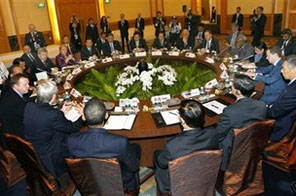APEC leaders call for new growth strategies
SINGAPORE: Stimulus spending and other strong actions have set the stage for global economic recovery, but nations must push ahead with free trade and investment to ensure growth, President Barack Obama and fellow Asia-Pacific leaders said Sunday.
Obama and 20 other leaders, meeting in Singapore for the annual Asia-Pacific Economic Cooperation forum, rejected all forms of protectionism and agreed on the need for a long-term growth strategy that takes into account the diverse needs of economies in a region stretching from Chile to China.
Recovery is not yet on solid footing and the region cannot go back to "growth as usual," Singapore Prime Minister Lee Hsien Loong said, reading from a joint statement by the APEC leaders.
"We need a fresh growth paradigm. We need a fresh model of economic integration," they said.
To that end, APEC members pledged to maintain their economic stimulus policies until a durable economic recovery has clearly taken hold. "We will pursue growth which is balanced, inclusive and sustainable to ensure a durable recovery that will create jobs and benefit our people," they said.
Nations must work toward "strong, sustainable and balanced global economic growth" in the post-crisis period with policies that expand opportunities for all sectors of society, including women and small business owners; take better care of the environment; and promote development while reducing poverty and ensuring security, they said.
There was no mention of currency rates in the final statement, despite finance ministers' calls for maintaining "market-oriented exchange rates." That was a reference to the Chinese currency, the yuan, which is kept artificially undervalued, making other currencies less competitive.
An earlier push for concrete goals for reductions of greenhouse gas emissions was cut out of the statement. A previous draft had pledged a 50 percent reduction from 1990 levels by 2050, but the final statement committed only to working toward "an ambitious outcome" at climate talks in Copenhagen, Denmark, next month.
APEC, which accounts for 40 percent of the world's population and 54 percent of global output, was created 20 years ago to promote greater trade and integration among Pacific Rim nations. Pledges are nonbinding, and the forum's scope has expanded to encompass issues such as climate change, energy and food security, and politics.
One key APEC goal is the creation of a free-trade area covering all 21 APEC economies — an ambitious undertaking that many acknowledge is years down the road.
There have been concerns that the U.S., the world's biggest economy, and other nations might turn inward as they grapple with the worst global financial crisis in decades.
But Obama and others reinforced calls for expansion of free trade rather than resorting to protectionist measures, and pushed hard for progress on talks to liberalize world trade.
They supported studies on the benefits of a future Asia-Pacific free trade area and pathways to realizing the broad pact.
It could take 10 or 15 years for a region as wide as APEC, with countries at such different stages of development, Taiwan's finance minister, Shih Yen-shiang, said this past week. Still, Shih said Taiwan endorses the free trade area as a long-term goal.
APEC must move "very, very incrementally and carefully," said Surin Pitsuwan, secretary-general of the Association of Southeast Asian Nations.
Leaders also stressed the need to invest in education, health care and employment training to ensure stability in the long term.
Following the APEC meetings, Obama was to hold a summit with all 10 ASEAN leaders, including military-ruled Myanmar. The leaders are expected to call on Myanmar's junta to hold credible elections, but a joint statement obtained by AP stops short of demanding the release of pro-democracy leader Aung San Suu Kyi and other political prisoners.
Associated Press writers Jim Gomez and Jae-soon Chang contributed to this report.






